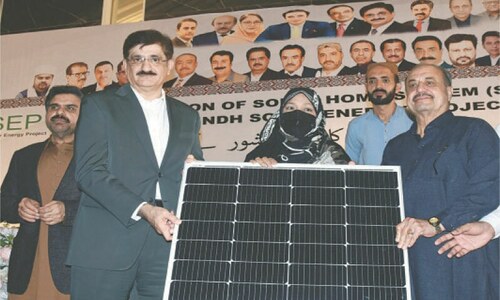SUKKUR: Quite unlike other dolphins, the Indus river dolphin is a unique species. When coming into the Karachi harbour, people in boats are often pleasantly surprised to find friendly and happy dolphins chasing their vessels as they leap and dance. In contrast the blind and smaller in size Indus dolphin is cautious and quiet.
Guarded in nature, these mammals in the river, seem to know themselves about the dangers around them, which have made them an endangered species. Your boat in the river may be surrounded by several blind dolphins but you only get to see a grey hump disappearing into the water, that too if you are lucky and alert. Still, the small ripples, which they make as they come out to breathe, carry big effects.
Sher Mohammad is a local community volunteer, working along the river banks. The volunteers, identifiable by their blue badges and caps with the printed message Bulhan ko bachao, are part of the World Wildlife Fund for Nature, Pakistan’s (WWF-Pakistan) programme to empower communities and protect biodiversity.
‘Bulhan’ is the local word for the Indus dolphin. “When fishermen spread out their nets to catch fish in the river, we ask them to first make sure there are no dolphins getting caught in them,” Sher Mohammad told Dawn. “If they find any dolphins, they are to immediately lower their nets to help them escape,” he explains.
Under fund’s programme, volunteers educate fishermen about steps to ensure safety of the mammal
Asked if the dolphins understand enough to move out of the net, Sher Mohammad smiled. “They are very smart creatures. They can’t see but they can hear, which helps them know and understand all dangers,” he added.
“Also, our looking out for them day and night here has helped in increasing their dwindling population,” he said. “Earlier, people used to catch them and kill them to extract oil.
We had that practice stopped by spreading awareness that the oil had no medicinal value. It is plain fat,” he added.
“The Indus dolphin is my saheli [bestie],” said Najma Khatoon, also a WWF volunteer. “Since our telling people about the endangered creatures, things here have changed so much that if a dolphin gets stuck in a net by mistake, the fishermen themselves cut their nets to help it escape,” said Najma.
Apart from explaining to the locals about the importance of saving the dolphins, the programme is also helping them sustain their own livelihoods through other means than fishing. The women have been shown how they can grow vegetables through kitchen gardening. “That way they can use the vegetables they grow in their own cooking and also sell the extras in their village to make a little money,” said Hasina Tumrani, a community mobiliser for the WWF.
Meanwhile, Toheed Ghani Mahesar, manager, Food and Agriculture Programme for WWF-Pakistan, said that there are many things aligned with the Indus dolphin. “When a species here is not doing well and is endangered, it also points to river health and environmental degradation. That’s when conservation of the environment becomes necessary. You need to act to save your planet,” he pointed out.
It was explained how in the last 50 years or so, while building a concrete jungle we started killing the real jungle. We have unknowingly harmed 73 per cent of our biodiversity, which is apparent with the disappearance of so many plants, insects and animals and the increased frequency of natural disasters.
Muhammad Imran Malik, coordinator conservation for WWF-Pakistan, said that there are some 2,000 dolphins, of six species, from Jinnah to Sukkur Barrage. While pointing out the many reasons behind the high mortality rate of the dolphins, the biggest of which was entanglement in fishing nets and getting stuck in canals, he said that saving wildlife not just needs patience, but also funding.
He mentioned some of the programmes for the cause such as the ‘Bhulan Dost Programme for Community Engagement’, which engages around 200 fisherfolk for dolphin sighting and threats related data collection and ‘Youth Engagement Stewardship’, which establishes nature clubs in schools for student education and develops awareness toolkits with interactive games for engaging students.
Besides, there are also capacity building programmes where community members are trained as eco-guides for dolphin watch boat safaris. Fishing boats have also been converted to eco-tourism boats with joint branding of WWF-Pakistan and Bank Alfalah for this purpose.
Published in Dawn, January 7th, 2025
















































